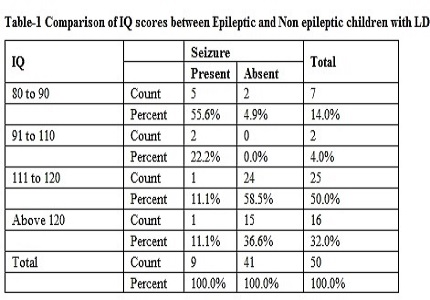Study of prevalence of epilepsy and its co morbidities in children with learning disabilities (LD)
Abstract
Introduction: There is higher association of learning disability (LD) in children with epilepsy. The study was done to find out the prevalence of epilepsy in children with learning disabilities and to examine the seizure factors and side effects of antiepileptic medications that place children at a higher risk of association with Learning Disability.
Methodology: In this observational cross-sectional study, children of age group 8yr-15yr who were diagnosed as learning disabled on the basis of a comprehensive developmental, psycho-educational evaluation by the expert panel were enrolled randomly and evaluated for epilepsy. Study population of learning disabled children was divided in two groups-those with epilepsy and without epilepsy. Seizure variables like seizure control, seizure type, cause of seizure, medication status, age of onset, drugs, monotherapy v/s polytherapy were studied among these two groups.
Results: Prevalence of epilepsy in children with LD was found to be 18%. A significant association of pregnancy related complications (p=0.009,df=2), birth asphyxia (p=0.031,df=1), neonatal seizures (p=0.031,df=1) and meningitis (p=0.031,df=1) was found in children diagnosed to have LD with epilepsy. Higher occurrence of gross (p=0.002,df=1) and fine motor (p=0.031,df=1) developmental delay and significantly lower IQ was found in children with LD & epilepsy, compared to children with only LD.
Conclusion: Concurrence of epilepsy in learning disabled children puts them at higher risk for further academic problems. Epileptic seizures and various side effects of antiepileptic medications may affect the cognitive function. Referral for evaluation of LD must be advised in those epileptic children who have academic difficulties.
Downloads
References
2. Lhatoo SD, Sander JW. The epidemiology of epilepsy and learning disability. Epilepsia. 2001;42 Suppl 1:6-9. [PubMed]
3. Matthews T, Weston N, Baxter H, Felce D, Kerr M. A general practice-based prevalence study of epilepsy among adults with intellectual disabilities and of its association with psychiatric disorder, behaviour disturbance and carer stress. J Intellect Disabil Res. 2008 Feb;52(Pt 2):163-73. doi: 10.1111/j.1365-2788.2007.01025.x.
4. White RF, Campbell R, Echeverria D, Knox SS, Janulewicz P. Assessment of neuropsychological trajectories in longitudinal population-based studies of children. J Epidemiol Community Health. 2009;63 Suppl 1:i15-26.
5. Ramaa S, Gowramma IP. A systematic procedure for identifying and classifying children with dyscalculia among primary school children in India. Dyslexia. 2002;8(2):67-85. [PubMed]
6. Karande S. Current challenges in managing specific learning disability in Indian children. J Postgrad Med. 2008;54(2):75-7. [PubMed]
7. Huang YF, Chang HL, Wu YY, Huang YS, Liang HY. Clinical characteristics of children with learning disorders in Taiwan. Chang Gung Med J. 2007;30(5):423-9. [PubMed]
8. Karande S, Satam N, Kulkarni M, Sholapurwala R, Chitre A, Shah N. Clinical and psychoeducational profile of children with specific learning disability and co-occurring attention-deficit hyperactivity disorder. Indian J Med Sci. 2007;61(12):639-47.
9. Chaudhari S, Otiv M, Chitale A, Pandit A, Hoge M. Pune low birth weight study--cognitive abilities and educational performance at twelve years. Indian Pediatr. 2004;41(2):121-8. [PubMed]
10. Resnick MB, Gomatam SV, Carter RL, et al. Educational disabilities of neonatal intensive care graduates. Pediatrics 1998;102:308-314. [PubMed]
11. Fastenau PS, Jianzhao shen, Dunn DW, Austin JK. Academic underachievement among children with epilepsy: proportion exceeding psychometric criteria for learning disability and associated risk factors. J Learn Disabil. 2008;41(3):195-207.
12. Aldenkamp, A. P., Alpherts, W. C. J., Dekker, M. J. A. and Overweg, J. (1990), Neuropsychological Aspects of Learning Disabilities in Epilepsy. Epilepsia, 31: S9–S20. doi: 10.1111/j.1528-1157.1990.tb05874.x
13. Aldenkamp AP, Dreifuss FE, Renier W, Suurmeijer TP. Epilepsy in children and adolescents. CRC Press; 1995 Jul 10.
14. Eddy CM, Rickards HE, Cavanna AE. The cognitive impact of antiepileptic drugs. Ther Adv Neurol Disord. 2011;4(6):385-407 doi: 10.1177/1756285611417920. [PubMed]
15. Helmstaedter C, Witt JA. Cognitive outcome of antiepileptic treatment with levetiracetam versus carbamazepine monotherapy: a non-interventional surveillance trial. Epilepsy & Behavior. 2010 May 31;18(1):74-80.
16. Trimble MR. Anticonvulsant drugs and cognitive function: a review of the literature. Epilepsia. 1987 Dec 1;28(s3):S37-45. DOI: 10.1111/j.1528-1157.1987.tb05776.x
17. Shaywitz SE, Shaywitz BA. Dyslexia (specific reading disability). Biological psychiatry. 2005 Jun 1;57(11):1301-9. [PubMed]

Copyright (c) 2016 Author (s). Published by Siddharth Health Research and Social Welfare Society

This work is licensed under a Creative Commons Attribution 4.0 International License.


 OAI - Open Archives Initiative
OAI - Open Archives Initiative


